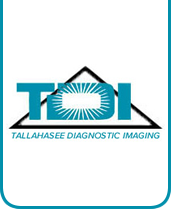MRI
Magnetic resonance imaging (MRI) uses a powerful magnetic field, radio waves and a computer to produce detailed pictures of the body’s internal structures that are clearer, more detailed and more likely in some instances to identify and accurately characterize disease than other imaging methods without the use of radiation.
Learn More About MRI
Magnetic Resonance Imaging (MRI) produces images of the body’s internal structures by passing radio waves through a powerful magnetic field. Differing frequencies of radio waves are produced by the different body structures, in return, and these are mapped and converted into digital images by a computer. MRI is especially good for imaging soft tissues in the body, including the brain, nerves, muscles and organs.
Through Tallahassee Diagnostic Imaging, RAoT features the latest, most advanced technology to benefit patients by offering you quality images to assist your clinician in your diagnosis and treatment plan. The latest MRI designs were created with your comfort in mind. TDI offers both open and high field MRI, hosting the only Toshiba 3T Magnet featuring Pianissimo technology in the North Florida, South Georgia region. Pediatric sedation is also available through our location inside TMH. Your clinician will determine which MRI is best for you.
Since you will be positioned within a large, very strong magnet, you must remove all loose metal objects. Doing so is important for your safety as well as that of our staff, and for proper functioning of the equipment. You may be asked to change into a gown unless you are wearing clothing that is metal-free. You will need to complete a detailed screening sheet, on which you will be asked whether or not you have any metal or other devices implanted in your body that may interfere with the scan or cause injury to you. If you have any concerns or questions about that aspect of the procedure, please ask the technologist before you enter the room. We also will be happy to answer your questions by telephone at any time before your appointment. Some types of scans require fasting beforehand. You will be instructed if fasting is necessary for your procedure. Patients not receiving sedation should arrive 30 minutes prior to your exam time in order to register. If your procedure has been scheduled with sedation or anesthesia, please arrive 1 hour prior to exam for sedation to be administered at the hospital or radiology office. Do not take prescribed sedation medications until after paperwork has been filled out and you are instructed to do so by the technologist. If you have any questions about your medications, please call the center where you are being scanned and ask to speak with a technologist. All patients receiving sedation must have someone with them to drive them home after the procedure.
Please let us know if you have any of the following:
- Cardiac Pacemaker
- Artificial heart valve prosthesis
- Eye Implants or metal ear implants
- Any metal implants activated electronically, magnetically, or mechanically
- Aneurysm clips
- Copper 7 IUD
- Penile implant
- Shrapnel or non-removed bullet
- Pregnancy
- Claustrophobia
- Any metal puncture(s) or fragment(s) in the eye
One of our board-certified Radiologists will interpret your exam and send a report to your physician within 5 business days. Contact your referring physician for any information pertaining to the findings.
Typically your referring physician will schedule an appointment for you. If you have been asked to schedule the appointment yourself, please have your physician’s order and any pre-authorization information required by your insurance or health plan provider in hand, and call 850-878-4127.
During an MRI exam, you will lie on a moveable exam table that will slowly move into the machine. This procedure is non-invasive and there is no pain associated with this exam. Some of the common distractions or discomforts include the loud tapping noises that are often made by the machine or the close proximity to the MRI machine. For patients who are claustrophobic or who become uncomfortable in these situations, they may be prescribed a mild sedative to be taken before the exam.
You also may notice a warm feeling in the area being studied. This is normal but you should not be afraid to communicate to the technologist if it bothers you. A technologist will always be available, monitoring you throughout the exam if any concerns arise.
Because an MRI exam takes images or “slices” from various angles, several sequences or sets of images will be taken. Each sequence will last from one to 10 minutes, and the technologist will inform you before the scanning noise begins. The total exam time for a scan can range from 30 to 60 minutes. You must lie very still during each sequence, in order to produce clear, diagnostic images.
To maximize your comfort throughout the exam, music systems are in place with headphones. Patients are welcome to bring a CD of their choice to listen to during the exam. For additional comfort, a family member or friend may accompany young or elderly patients during the MRI. Companion must be 18 or older and must be screened before entering the exam room.
Depending on your symptoms or prior medical history you may be given an intravenous contrast medium for your scan. The technologist will explain this procedure to you if necessary.
Tallahassee Diagnostic Imaging inside Radiology Associates
1st Floor – Please Check-in at TDI Desk to the left of the lobby entrance
1600 Phillips Road
Tallahassee, FL 32308
Free parking.
Tallahassee Diagnostic Imaging inside Tallahassee Memorial Hospital
1300 Miccosukee Rd.
Tallahassee, FL 32308
Please check-in at the Hospital Admittance, and someone will escort you to the Imaging Center.
There is a waiting room for family and friends inside the TDI Imaging Center at TMH provided for your convenience.
Parking is available in the patient garage. The charge for parking is $1.
